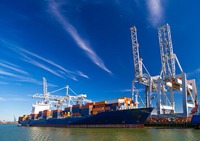An export license is a legal document issued by the government of a country that authorizes individuals or businesses to export certain goods or services to other countries. It is a regulatory measure that ensures compliance with trade laws, controls the flow of goods, and protects national security, economic interests, and public safety.
The purpose of an export license is to regulate and monitor the export of specific goods or technologies that may have strategic, military, dual-use, or sensitive applications. These goods could range from military equipment and weapons to advanced technology, controlled substances, or cultural artifacts. The license helps to prevent the unauthorized transfer of such items to unauthorized individuals, organizations, or nations.
The process of obtaining an export license typically involves submitting an application to the relevant government authority responsible for export controls. The application requires detailed information about the goods or services to be exported, the intended destination, the end-user, and the purpose of the export. The government agency carefully reviews the application, assessing factors such as national security concerns, compliance with international laws, and the potential impact on domestic industries.
Export licenses can be categorized into different types, depending on the nature of the goods, the destination country, and the specific regulations of the issuing country. Some licenses may be required for all exports, while others may be specific to certain industries or countries. In some cases, an export license may not be required if the goods fall under exemptions or are considered low-risk items.
Obtaining an export license is crucial for exporters as it ensures compliance with legal requirements and helps mitigate the risk of penalties, fines, or legal consequences. It also helps maintain transparency in international trade and prevents the proliferation of goods that could pose a threat to global security or violate international agreements.

It is important for exporters to stay informed about the export control regulations of their country and the destination countries they intend to trade with. These regulations may vary depending on political, economic, or security considerations, and they can change over time. Exporters should consult with legal experts or government authorities specializing in export controls to ensure compliance and facilitate smooth international trade operations.
In summary, an export license is a legal document that grants permission to individuals or businesses to export specific goods or services. It is a crucial tool for governments to regulate and control the flow of goods, protect national security interests, and ensure compliance with international trade laws. Exporters must navigate the complexities of export control regulations to obtain the necessary licenses and engage in legal and responsible international trade.
The specific products that require an export license vary depending on the country of export and the destination country. Each country has its own regulations and controls in place to determine which goods or technologies are subject to licensing requirements.
some general categories of products
However, there are some general categories of products that commonly require an export license:
1. Military and Defense-Related Goods: These include weapons, ammunition, military vehicles, explosives, and other items with potential military applications.
2. Dual-Use Goods: Dual-use goods are items that have both civilian and military applications. Examples include certain types of advanced technology, encryption software, aerospace components, and certain chemicals.
3. Controlled Substances: Goods that are subject to drug control laws, such as certain pharmaceuticals, chemicals used in drug production, and precursor chemicals, may require an export license.
4. Nuclear Materials and Technology: Exporting nuclear materials, nuclear equipment, or nuclear technology usually requires a specific export license due to the potential risks associated with nuclear proliferation.
5. High-Tech and Advanced Technology: Certain high-tech products, such as advanced computer systems, sensitive electronics, aerospace technology, and telecommunications equipment, may be subject to export controls.
It is important to note that the specific regulations and licensing requirements can vary from country to country. Additionally, the destination country may have its own import restrictions or licensing requirements for certain goods. Therefore, it is essential for exporters to research and consult with the appropriate government authorities or legal experts to determine whether their specific products require an export license.
On the other hand, many products do not require an export license and can be freely traded. These typically include everyday consumer goods, non-sensitive industrial products, and goods that do not have any strategic, military, or dual-use applications. However, it is still advisable to research and confirm the export requirements of the destination country to ensure compliance with their specific regulations.
It is important for exporters to stay updated with the latest export control regulations and seek guidance from the relevant authorities to determine whether their specific products require an export license.

Exporting goods without the necessary license can have serious consequences, both for individuals and businesses involved.
some potential repercussions
1. Legal Consequences: Exporting goods without the required license is a violation of export control laws and regulations. It can result in criminal charges, fines, penalties, and even imprisonment, depending on the severity of the violation and the jurisdiction involved. Legal consequences may include civil lawsuits, administrative penalties, or criminal prosecution.
2. Loss of Export Privileges: Engaging in unauthorized exports can lead to the revocation or suspension of export privileges. This means that individuals or businesses may be barred from participating in future export activities, which can significantly impact their ability to engage in international trade.
3. Damage to Reputation and Business Relationships: Exporting goods without the necessary license can harm a company's reputation and credibility in the international business community. It can lead to distrust among partners, customers, and suppliers, which may result in the loss of business relationships and opportunities.
4. Economic Sanctions and Trade Restrictions: Exporting certain goods without the appropriate license can trigger economic sanctions or trade restrictions imposed by the exporting country or other nations. These sanctions can include trade embargoes, import bans, or other trade barriers that can severely limit or halt business operations in specific markets.
5. National Security Concerns: Export control regulations aim to protect national security interests by preventing the unauthorized transfer of sensitive technologies, military equipment, or strategic goods. Exporting such items without the necessary license can raise national security concerns, potentially leading to investigations, heightened scrutiny, and increased surveillance of individuals or businesses involved.
6. Damage to International Relations: Unauthorized exports can strain diplomatic relations between countries. It can lead to diplomatic protests, trade disputes, or other retaliatory measures from the affected countries. These consequences can have broader implications for international cooperation, trade agreements, and political relations.
7. Supply Chain Disruptions: Exporting goods without the required license may result in the seizure, confiscation, or delay of shipments by customs authorities. This can cause disruptions to supply chains, financial losses, and damage to customer relationships.
It is essential for exporters to understand and comply with the export control regulations of their own country and the destination countries they intend to trade with. Seeking legal advice, conducting due diligence, and obtaining the necessary licenses before engaging in export activities can help mitigate these potential consequences and ensure compliance with applicable laws and regulations.